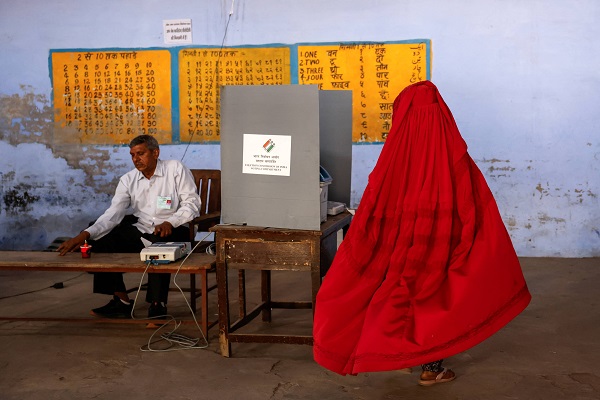

India’s general election closed on June 1, 2024, with about 642 million voters who cast their ballots in the staggered seven-phase polling over six weeks.
The world’s biggest election involved over one million polling stations spread across the country, from remote corners of the Himalayas to far-flung forests deep in Nagaland. Each polling station served a maximum of 1,500 people.
The process involved over 15 million people, 400,000 vehicles, nearly 1,700 air sorties, and 135 trains moving across the country.
Each voting location used Electronic Voting Machines (EVMs) which were first introduced in 1982. Instead of issuing a ballot paper, electors cast their votes by pressing a button next to a candidate’s name and party symbol. It has been deployed widely in the country from 2000.
Nearly 1.8 million Voter-Verifiable Paper Audit Trail (VVPAT) systems and 1.7 million control units were deployed for the 2024 elections across 1.05 million polling stations.
The VVPAT system is attached to the EVM to confirm the vote. It prints a small slip of paper carrying the symbol and name of the candidate voted for. This is visible to the voter for a short period, and can be later used by the Election Commission of India (ECI) to verify the votes.
However, the EVMs have drawn criticism that they are vulnerable to tampering. Opposition parties say all paper slips should be counted separately to rule out hacking of the machines or any other manipulation.
Congo, India, other foreign govts paid Trump firms $7.8m as U.S. president
“There is no question of EVMs being programmed several times, or manipulated by connecting to a cell phone, Bluetooth devices, replacing part of it or through any other form of manipulation,” Reuters quoted the Commission as saying.
Indian courts have largely endorsed EVMs.
After voting, people receive a mark of purple ink on their index finger as an indication that they have cast their ballot.
ECI guidelines say no voter should be more than 2 km away from a polling station. This means that in densely populated swathes of the country in states like Karnataka, the distribution of polling stations tends to follow a similar pattern to population density.
Clusters of stations in major cities and towns are evident, along with populated road networks. Rivers and sparsely populated, rugged terrain or jungle show as empty space.
Home to 60 million people, Karnataka is one of the higher populated states in India. This year it needed a little over 46,000 polling stations.
For such a mammoth exercise, nearly 11 million government officials and security forces were deployed, traveling by foot, road, special train, helicopter, and boat.
Election officials traveling to cut-off locations need to carry all of the necessary equipment and paperwork with them across rough terrain and any obstacles.
Voting machines are packed in special carry cases after disconnecting power supply from connected batteries once voting is completed. They are sealed with the official stamp of the ECI and candidates’ agents. Journeys carrying these machines can sometimes take days.
In a statement, the ECI noted that vehicles carrying EVMs and VVPAT shall be fitted with a GPS tracking device so that their movement is monitored.
PHOTOS: Baby born with 14 fingers, 12 toes in India
In total, around 1.8 million of these machines were used in the election, deployed throughout the country in phases.
When packed away, the voting machine breaks up into a group of three carry cases. These cases may differ depending on the model of machine but the largest of the three is around 37 cm tall. When not in transit, they are placed next to each other in groups inside secure strong rooms, used by the election commission to prevent tampering.
The ECI has made elaborate arrangements to conduct a free and fair election and ensure that no voter is left behind.
A prime suspect (name withheld) in the kidnapping and killing of a Catholic priest in…
The Nigerian National Petroleum Company (NNPC) Limited has announced that it is at the final…
A 34-year-old man, Iyayi Omokaro, has allegedly killed his 38-year-old elder brother, Friday Omokaro, during…
Ahead of his 73rd birthday on Saturday, March 29, 2025, President Bola Tinubu will join…
The National Youth Service Corps (NYSC) has urged female corps members to return home to…
Bisola Ajimobi Kola-Daisi, the eldest daughter of the late former governor of Oyo State, Abiola…
This website uses cookies.